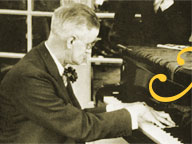TRACK #2: Discussion | Lyrics | About the Composer • • • JUMP TO CD #2 »

From CD #1:
Silent, O Moyle
Words by Thomas Moore, to the air "My Dear Eveleen";
musical arrangement by N. Clifford Page
Composer Biographies
Thomas Moore
Click to enlarge

Born in Dublin in 1779, Thomas Moore remains one of Ireland's most beloved poets, but he was also a talented composer and accomplished musician. His best-known work, Irish Melodies, began serial publication in 1808. The final edition of 1834 contains 130 of his poems set to music composed or arranged by both Moore and Sir John Stevenson. The collection includes a number of songs that are readily familiar to the modern ear and still performed to this day, including "Silent, O Moyle," "'Tis the Last Rose of Summer," "Believe Me If All Those Endearing Young Charms," and "The Harp That Once Through Tara's Halls."
Moore was a precocious child, publishing his first verses at the age of 11. As a boy he studied French, Italian, and music, and in 1794 he entered Trinity College. Later, by dint of his verses and singing, he became a familiar and well-liked figure in London, where he had gone to study law.
With the first publication of his Melodies, he found himself both rich and a popular hero. Although not a revolutionary, he was a friend of Robert Emmet; and his songs, which were performed for and acclaimed by the English aristocracy, had the effect of arousing sympathy for the Irish nationalist movement.
Influenced in part by Scott's historical novels, Lord Byron's "oriental" tales, and the popularity of the newly translated 1001 Nights, Moore in 1817 published Lalla Rookh, a narrative poem set in the Mideast (or at least an 18th-century Irishman's conception of the Mideast). It was wildly successful, selling out in a matter of days and running through half a dozen editions over the next six months. It quickly became the most translated work of its time. The prologue to a cantata based on Lalla Rookh, composed by Frederick Clay, is the source for the song "I'll Sing Thee Songs of Araby" (track #5 on the CD, Music from the Works of James Joyce).
In 1818 Moore published the first of his National Airs, and in that collection appeared the song "Oft in the Stilly Night," also performed on the CD.
Lord Byron was a devoted friend; and after the poet died in Greece, his personal memoirs fell into Moore's possession. In one of the great belletristic tragedies of the Romantic period, Moore and the publisher John Murray decided to burn these priceless pages — probably out of concern for Byron's reputation. Moore later wrote a biography of the poet, which was published with the Letters and Journals of Lord Byron (1830).
In poor health and his mind failing, Moore died in Wiltshire, England, in 1852 (just 30 years before James Joyce was born).
Although he never achieved the literary stature of contemporaries such as Byron, Shelley, and Coleridge, his poetry and music are marked by a broad popular appeal that resonates to the present day. The extent of his influence on the writings of James Joyce cannot be overestimated.
A marvelous online resource with the original texts from Moore's Irish Melodies (along with many other treasures) can be found at Bob Blair's literature site.
*There are many likenesses of Thomas Moore on display in London's National Portrait Gallery; they can be viewed online at the NPG Web site. In addition, in New York's Central Park there is a bronze bust of Moore, created by the sculptor Dennis Sheahan and donated to the city by a group of Irish-Americans. The bust is located at East 61st Street, off Fifth Avenue, on a path leading to the Pond. <<
N. Clifford Page
A somewhat obscure figure in the music world, N. Clifford Page is best known as an arranger of popular melodies and light classical pieces for small orchestras and bands. Some of his arrangements include:
- "Autumn Storms" (by Edvard Grieg)
- "Carry Me Back to Old Virginny" (words and music by James Bland)
- "Choral Fantasia" (from Gounod's Faust)
- "Dawning of the Day" (words by P.W. Joyce, to an old Irish air)
- "Eleventh of September" (traditional 18th-century minuet)
- "Go Down Moses" (traditional)
- "Hungarian Dance #5" (by Brahms, orchestrated by Page in 1924)
- "Love's Old Sweet Song" (words by G. Clifton Bingham, music by J.L. Molloy)
- Rákóckzy March (Hungarian melody)
- "Swing Low, Sweet Chariot" (words and music by H.T. Burleigh)
- "Would God I were the Tender Apple Blossom" (Words by Katherine Tynan-Hinkson, to the Londonderry Air)
Page also composed the song "Three Little Chestnuts" (1897). In 1928 he and Arthur Edward Johnstone published a book titled Instruments of the Modern Symphony Orchestra and Band.
[Note: Any additional biographical information on this composer that visitors can provide would be greatly appreciated. Feel free to email us, and your contribution will be credited on the site.]




 Albany, New York :: Boston, Mass. :: Essen, Germany
Albany, New York :: Boston, Mass. :: Essen, Germany